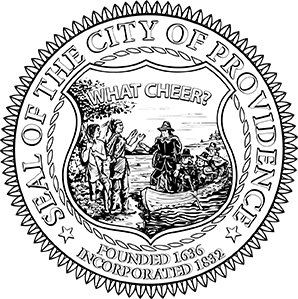We can’t manage what we can’t measure
Over the last decade, Providence has made significant strides toward becoming a more equitable, low-carbon, climate resilient city. The Sustainability Dashboard represents data that helps the City monitor progress related to objectives and targets set forth in two key documents: Providence’s Climate Justice Plan (2019) and Sustainable Providence (2014).
Providence’s Climate Justice Plan, co-developed by the City’s Department of Sustainability and the Racial and Environmental Justice Committee of Providence, sets concrete carbon reduction targets in buildings and transportation sectors while promoting clean energy sources. It also addresses the system-level changes that are needed in our governance structures, our economic system, and the overall health of our communities to ensure a just and equitable transition away from fossil fuels.
Providence’s Climate Justice Plan builds upon the momentum of Sustainable Providence, the city’s plan to promote sustainability in six topic areas: Waste, Food, Transportation, Water, Energy, and Land Use and Development.
Climate
Objective
Become an equitable, low-carbon, climate resilient city.
Targets
Providence’s Climate Justice Plan has over 20 targets and 15 targets to develop that aim to make Providence a carbon neutral city while addressing the historically racist, extractive systems that have brought us to the point of climate crisis. Targets that the City currently has data for have been incorporated throughout the dashboard.
Resources
Energy
Objective
Transition to 100% clean energy supply in Providence, with a focus on local generation and equitable access.
Targets
Achieve a minimum of 30% energy use reduction by 2030 in all city-owned property.
Expand renewable energy and clean energy projects and implement energy reduction policies and practices city-wide.
By 2035, 50% of electricity is carbon-free citywide.
By 2050, 100% of electricity is carbon-free citywide.
Local generation accounts for 30% of supply.
Targets to Develop
Number of low to moderate income Providence residents enrolled in community solar.
Percentage of clean energy assets in Providence owned by frontline community organizations and individuals.
Resources
Water
Objective
Strive for all water bodies to be clean, healthy and accessible and to provide high quality, affordable drinking water to all residents.
Targets
Increase Cast Iron Water Main Replaced/Relined to 144 Miles by December 2030.
Increase annual net gain in trees to 200 by December 2020.
Prioritize tree plantings in frontline communities, low-canopy areas and where heat island index is high so residents can experience the cooling (electricity savings), air pollution, and water filtration benefits.
Pursue pavement reduction strategies and implement green infrastructure projects to improve water quality, stem stormwater flow, and reduce flooding.
Regenerative Economy & Zero Waste
Objective
Build a sustainable, zero-waste economy in Providence, one in which we produce and consume to live well without living better at the expense of others, with a focus on supporting local businesses and creating meaningful work for local frontline community members. Fully implement a zero waste strategy by 2030.
Targets
Eliminate food waste in Providence by 2040.
Eliminate contaminated recycling by 2030.
Increase Residential Recycling Rate to 30% by 2020.
Meet annual targets of 10% of City spending in municipal purchases of goods and services from state-certified women-owned enterprises and 10% of City spending in municipal purchases of goods and services from state-certified minority-owned enterprises as outlined in City ordinance.
Targets to Develop
Increase number of enterprises in Providence that are democratically controlled and operated by their own workers.
Increase partnerships with frontline community organizations for workforce training.
Expand training and educational opportunities offered through the PVD Self Employment Program for unemployed and underemployed Providence residents, specifically for frontline communities.
Increase investments from the Providence Business Loan Fund that are supporting enterprises that are engaging in a circular and regenerative economy, specifically to people of color in Providence.
Resources
SustainPVD: Zero Waste Composting in Providence Office of Economic Opportunity
Transportation
Objective
Ensure that all Providence residents have access to clean and efficient public transportation and infrastructure that supports walking and riding bicycles, while reducing carbon and co-pollutants in the city, with a focus on areas with cumulative health impacts.
Targets
By 2035, 11% reduction in Vehicle Miles Traveled (VMTs) and by 2050, 20% reduction in VMTs.
By 2035, 43% of VMTs in Providence are electric and by 2050, 80% of VMTs are electric.
By 2035, increase the number of employers in Providence offering RIPTA’s EcoPass to their employees from 50 to 200.
Increase the number of trips taken using JUMP Boost plan subscriptions to 10%.
Targets to Develop
Increase in public transit ridership in Providence.
Reduce diesel truck traffic in frontline communities.
Increase low-carbon transit options in frontline communities.
Increase sidewalk maintenance and investment in frontline communities.
Resources
Food
Objective
Provide every Providence resident with access to safe, affordable, nutritious, and culturally appropriate food.
Cultivate a healthy food system by adopting ecologically sound and sustainable practices and ensuring fair working conditions. Support long-term economic development in the food sector.
Resources
Housing, Buildings, Land Use & Development
Objective
End displacement and ensure dignified housing and access to affordable, efficient and clean energy for Providence residents while eliminating fossil fuel use in all buildings.
Targets
By 2035: 48% of residential heating and 45% of commercial converted to heat pumps.
By 2050: 90% of residential heating and 85 percent of commercial converted to heat pumps.
By 2040, reduce low-income energy burden to <5%. (Low income energy burden is the percent of income that low-income households are spending on energy)
By 2040, eliminate utility shut offs.
All proposed land use and development projects be evaluated using the “Sustainability Evaluation Tool” and the “Just Providence” Framework.
Targets to Develop
Increase the energy savings (MMBTUs) for low income households in Providence.
Increase low-income energy efficiency program participation.
Increase energy efficiency and electrification investment dollars for low income households.
Housing and anti-displacement metrics and targets.


